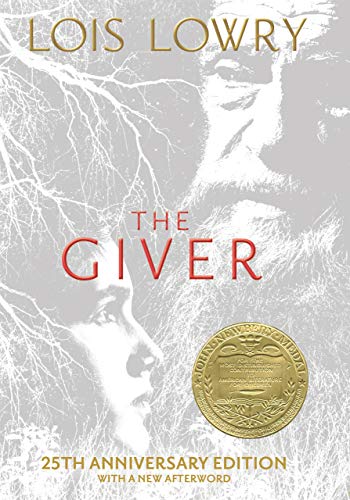
About
Title: The Giver Authors: Lois Lowry Category:supplementals Number of Highlights: 30 Date: 2022-07-17 Last Highlighted: **
Highlights
It was the sort of thing one didn’t ask a friend about because it might have fallen into that uncomfortable category of “being different.” Asher took a pill each morning; Jonas did not. Always better, less rude, to talk about things that were the same.
“But sir,” Jonas suggested, “since you have so much power —” The man corrected him. “Honor,” he said firmly. “I have great honor. So will you. But you will find that that is not the same as power.
He had walked through woods, and sat at night beside a campfire. Although he had through the memories learned about the pain of loss and loneliness, now he gained, too, an understanding of solitude and its joy.
There was never any comfortable way to mention or discuss one’s successes without breaking the rule against bragging, even if one didn’t mean to. It was a minor rule, rather like rudeness, punishable only by gentle chastisement. Better to steer clear of an occasion governed by a rule which would be so easy to break.
“The worst part of holding the memories is not the pain. It’s the loneliness of it. Memories need to be shared.”
He found that he was often angry, now: irrationally angry at his groupmates, that they were satisfied with their lives which had none of the vibrance his own was taking on. And he was angry at himself, that he could not change that for them. Without asking permission from The Giver, because he feared—or knew—that it would be denied, he tried to give his new awareness to his friends.
At dawn, the orderly, disciplined life he had always known would continue again, without him. The life where nothing was ever unexpected. Or inconvenient. Or unusual. The life without color, pain, or past.
Tags:perception
“If everything’s the same, then there aren’t any choices! I want to wake up in the morning and decide things! A blue tunic, or a red one?”
No one mentioned such things; it was not a rule, but was considered rude to call attention to things that were unsettling or different about individuals.
This evening he almost would have preferred to keep his feelings hidden. But it was, of course, against the rules.
All of it was new to him. After a life of Sameness and predictability, he was awed by the surprises that lay beyond each curve of the road. He slowed the bike again and again to look with wonder at wildflowers, to enjoy the throaty warble of a new bird nearby, or merely to watch the way wind shifted the leaves in the trees. During his twelve years in the community, he had never felt such simple moments of exquisite happiness.
Jonas trudged to the bench beside the Storehouse and sat down, overwhelmed with feelings of loss. His childhood, his friendships, his carefree sense of security—all of these things seemed to be slipping away. With his new, heightened feelings, he was overwhelmed by sadness at the way the others had laughed and shouted, playing at war. But he knew that they could not understand why, without the memories. He felt such love for Asher and for Fiona. But they could not feel it back, without the memories. And he could not give them those. Jonas knew with certainty that he could change nothing.
“I felt sad today,” he had heard his mother say, and they had comforted her. But now Jonas had experienced real sadness. He had felt grief. He knew that there was no quick comfort for emotions like those. These were deeper and they did not need to be told. They were felt.
“Animals?” Jonas suggested. He laughed. “That’s right,” Lily said, laughing too. “Like animals.” Neither child knew what the word meant, exactly, but it was often used to describe someone uneducated or clumsy, someone who didn’t fit in.
Jonas hesitated. “I certainly liked the memory, though. I can see why it’s your favorite. I couldn’t quite get the word for the whole feeling of it, the feeling that was so strong in the room.” “Love,” The Giver told him. Jonas repeated it. “Love.” It was a word and concept new to him.
The Giver shrugged. “Our people made that choice, the choice to go to Sameness. Before my time, before the previous time, back and back and back. We relinquished color when we relinquished sunshine and did away with differences.” He thought for a moment. “We gained control of many things. But we had to let go of others.”
“Do you understand why it’s inappropriate to use a word like ‘love’?” Mother asked. Jonas nodded. “Yes, thank you, I do,” he replied slowly. It was his first lie to his parents.
“You know that there’s no third chance. The rules say that if there’s a third transgression, he simply has to be released.” Jonas shivered. He knew it happened. There was even a boy in his group of Elevens whose father had been released years before. No one ever mentioned it; the disgrace was unspeakable. It was hard to imagine.
Rules were very hard to change. Sometimes, if it was a very important rule—unlike the one governing the age for bicycles—it would have to go, eventually, to The Receiver for a decision. The Receiver was the most important Elder. Jonas had never even seen him, that he knew of; someone in a position of such importance lived and worked alone.
“Who wants to be the first tonight, for feelings?” Jonas’s father asked, at the conclusion of their evening meal. It was one of the rituals, the evening telling of feelings.
For a contributing citizen to be released from the community was a final decision, a terrible punishment, an overwhelming statement of failure.